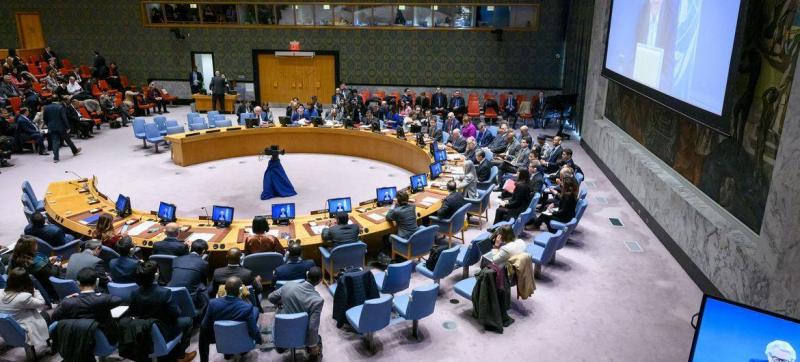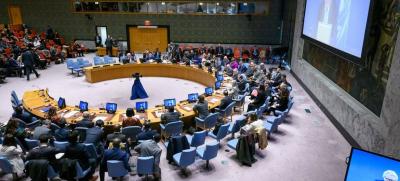United Nations Secretary-General António Guterres stated today, Wednesday, that “Gaza is living an epic humanitarian catastrophe,” adding in his speech to the world, “We must not turn a blind eye.” During a Security Council meeting chaired by Chinese Foreign Minister Wang Yi, Guterres mentioned, “Intensive negotiations are ongoing to extend the ceasefire in Gaza, which we strongly welcome. Still, we believe we need a real ceasefire for humanitarian reasons.” He added, “The people of Gaza are living in an epic humanitarian catastrophe before the eyes of the world; we must not turn a blind eye.” He addressed the Security Council, stating, “Anyone who supports a ceasefire fundamentally supports the continuation of Hamas's rule in Gaza.”
Chinese Foreign Minister Wang Yi stressed the need for the international community to take more active steps to save lives and restore peace in Palestine and Israel by first working towards a comprehensive and permanent ceasefire “with the utmost urgency.” In the Security Council meeting, which his country is presiding over, he expressed hope that the past days of the ceasefire would not represent a gap before another round of aggression but rather a beginning for further diplomatic efforts for a comprehensive and permanent ceasefire. He emphasized that the resumption of fighting in Gaza “would likely turn into a disaster engulfing the entire region.” Wang also noted that protecting civilians “is a red line in international law that cannot be crossed.” He reiterated China’s opposition to the collective punishment faced by Gaza's residents and the forced displacement targeting Palestinian civilians, calling for the release of all detained hostages.
The Chinese Foreign Minister urged for increased international and regional diplomatic efforts to reshape a credible multilateral process for a two-state solution and to resume direct negotiations between Palestine and Israel. He also called for a large-scale international peace conference and confirmed his nation's full support for Palestine’s full membership in the United Nations. Wang emphasized, “No solution to the current crisis should contradict the two-state solution or violate international law or relevant UN resolutions,” adding that “any arrangement concerning Palestine's future must fully reflect the will of the Palestinian people and accommodate the legitimate concerns of the countries in the region.”
Israel's permanent representative to the United Nations, Gilad Erdan, stated that the war “could end tomorrow, even today, if Hamas returns all the hostages and surrenders all its fighters involved in the massacre.” He pointed out that a real ceasefire lasting for decades could be achieved, adding, “Ask Hamas for this. This is the solution.” He noted that all discussions “focused only on humanitarian assistance, which is crucial, but ignore Hamas as the root of all suffering in Gaza,” asserting that more food, water, and medical supplies “will not bring us closer to a solution.” He criticized the UN officials who spoke last week before the Security Council regarding the situation in Gaza, also mentioning that this entire week was designated for solidarity with the Palestinians “despite all this starting only because Hamas executed a deliberate and unjustifiable massacre against Israelis.”
Saudi Foreign Minister Faisal bin Farhan noted that “voices calling for a ceasefire in Gaza are rising in the international community, including the presidency of the Security Council.” He indicated that “sustainable humanitarian assistance must be delivered to the Gaza Strip,” reiterating “Israel’s response to the requirements for peace and recognition of the Palestinian state.”
Palestinian Foreign Minister Riyad al-Maliki affirmed that the current ceasefire in Gaza must evolve into a complete and comprehensive cessation of hostilities, stressing that what has occurred in the sector “is not a war, but a massacre that no one or nothing can justify." He stated during the session, “Israel has killed over 15,000 people — including more than ten thousand women and children, as well as medical and humanitarian personnel and journalists — while targeting UN shelters, places of worship, and hospitals, despite the protections afforded to them under international law.” He questioned how many times the world can “bear failure in the test of humanity in Gaza and Palestine?”
Al-Maliki remarked that “Israel believes there is a special international law designed to fit its crimes, a law that allows the commission of war crimes, crimes against humanity, and genocide, a law that does not apply to its actions, but rather is based on the identity of the perpetrator and the identity of the victim." He indicated that we are at a “historic crossroads,” with time running out as “a politically resolvable conflict turns into an endless religious confrontation.” Riyad al-Maliki emphasized that the Palestinian people face an existential threat, “For all the talk of destroying Israel, it is Palestine that is facing a plan for its destruction, enacted in broad daylight, codified in laws and policies, and carried out by soldiers and settlers savagely. We are being erased from maps in every sense of the term.” He asserted that Israel is currently trying to “complete the task” it began during the Nakba 75 years ago, instead of accepting that “no force on earth can uproot Palestinians from Palestine, or Palestine from the hearts of Palestinians wherever they are.”
He renewed his government’s call “to provide international protection and to end impunity and prevent the repetition of the crimes endured by its people daily.” Al-Maliki affirmed that “Israel does not have the right to defend itself against an occupied people, adding that it “does not seek security and peace, but rather considers the establishment of a Palestinian state a strategic threat to it.” However, he asserted that revenge is not the solution; rather, the solution lies in achieving justice, emphasizing that Palestinian lives are no less sacred than those of any other people. He stated, “Justice will help us chart a path where no Palestinian or Israeli is killed.”
UAE Minister of State Khalifa Shaheen emphasized his country’s strong condemnation of what it termed "Israeli collective punishment policies" against the Palestinian people, expressing the UAE’s rejection of “attempts to displace Palestinians.” In his address during the Security Council's ministerial meeting, he stated that “the future and management of Gaza must remain in the hands of the Palestinian people, and no assumptions or plans seeking to separate the Strip from the State of Palestine can be accepted.” Shaheen also stressed the need for the international community to adopt uniform standards in condemning violations of international humanitarian law, including the indiscriminate bombing of civilians and civilian objects and United Nations facilities. He stated that “double standards concerning these issues create chaos in our international system.” He added that the scenes of complete destruction in Gaza are “alarming,” revealing an “unprecedented humanitarian catastrophe.” He confirmed that the ceasefire reached by both parties last week for a four-day cessation of hostilities, later extended for two additional days, is “a glimmer of hope to be built upon.” Shaheen emphasized the importance of ensuring full implementation of Security Council Resolution 2712 and establishing mechanisms to effectively monitor the resolution's implementation.




